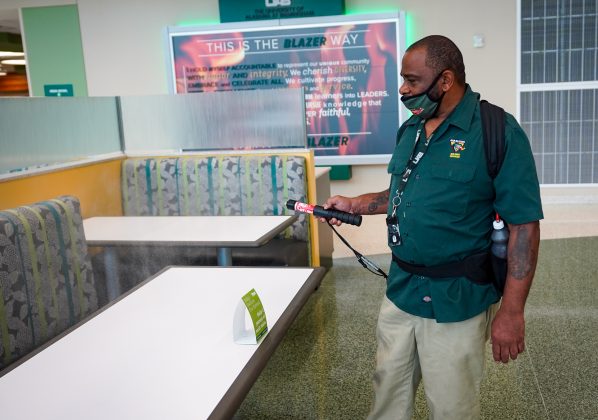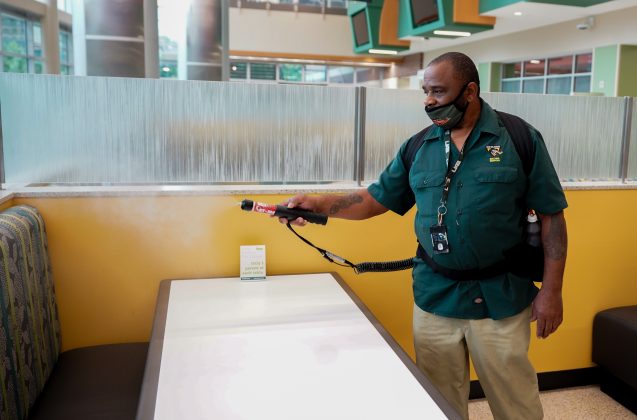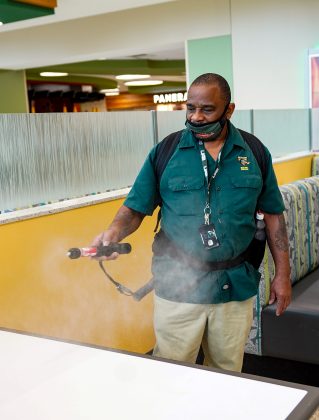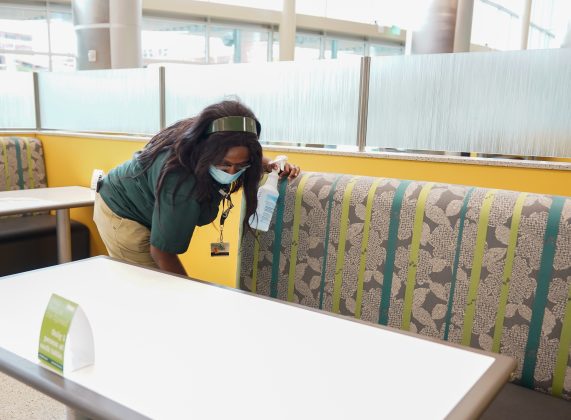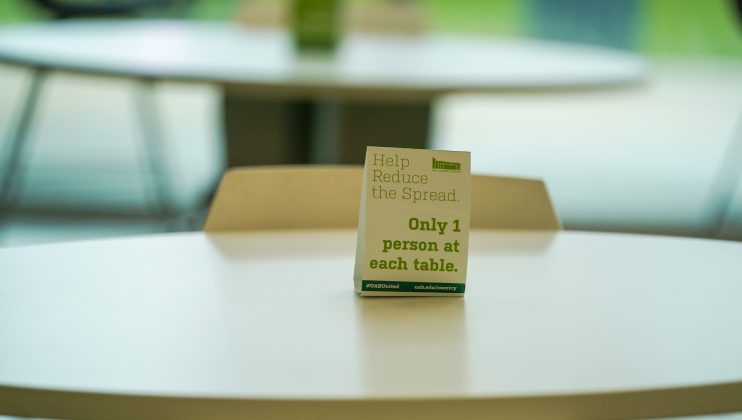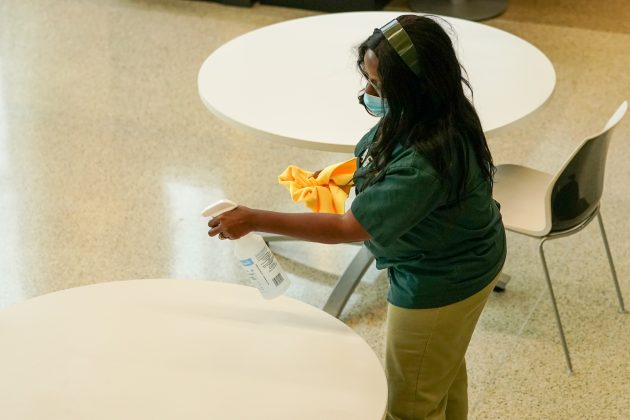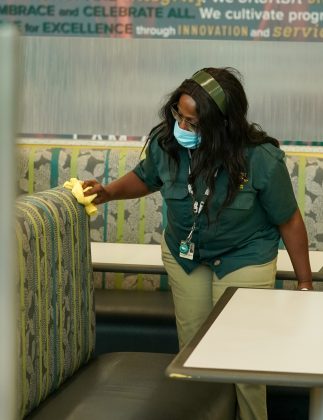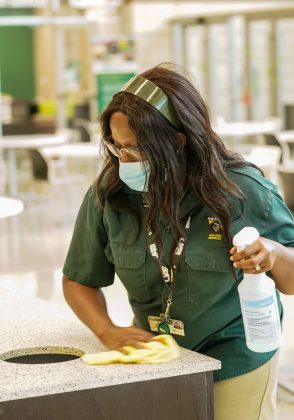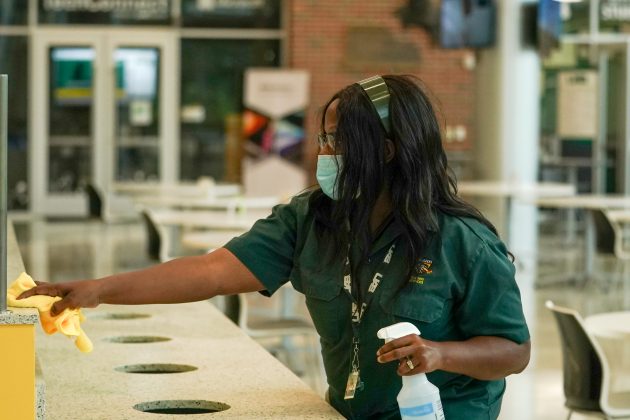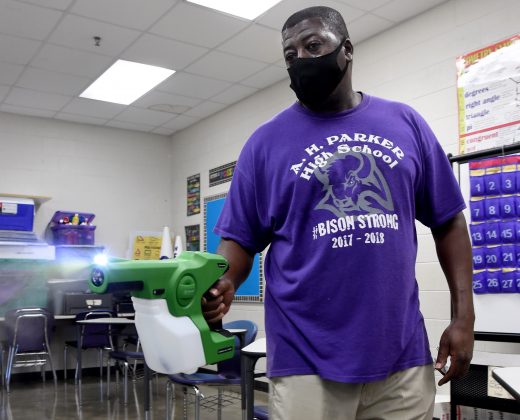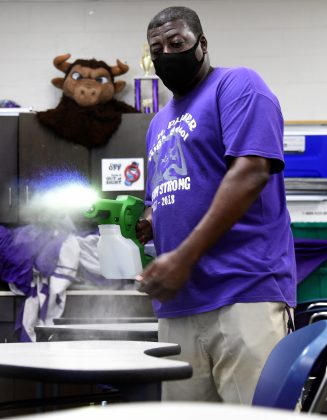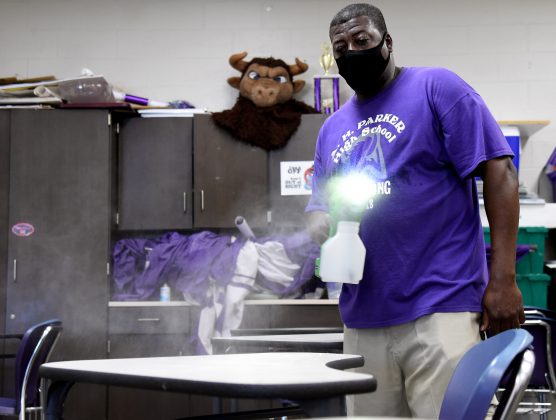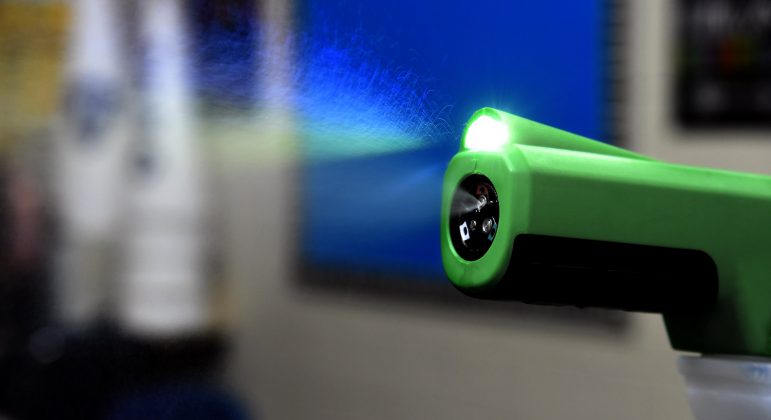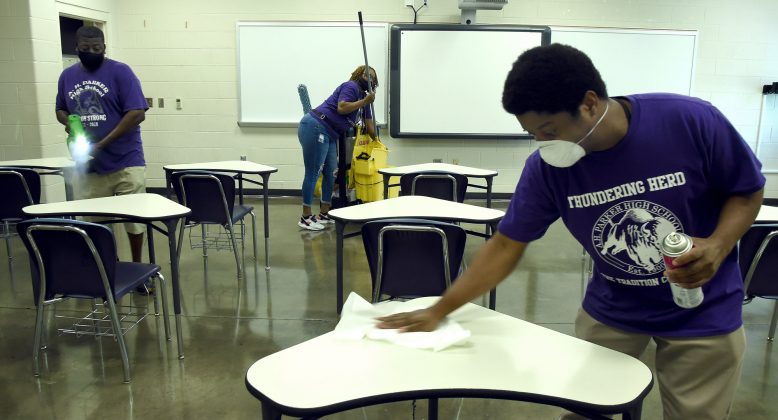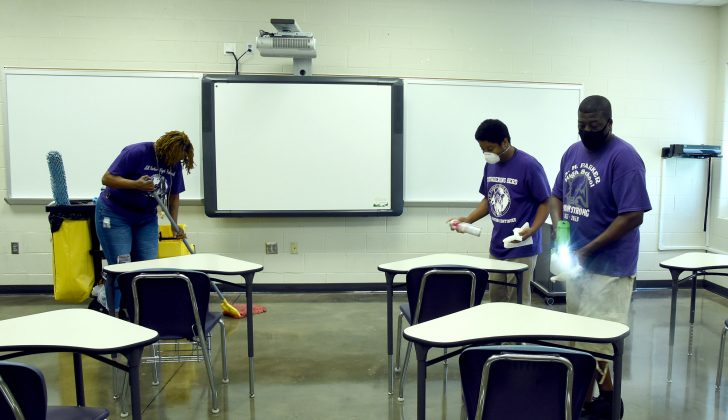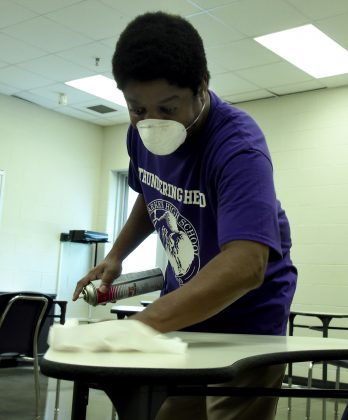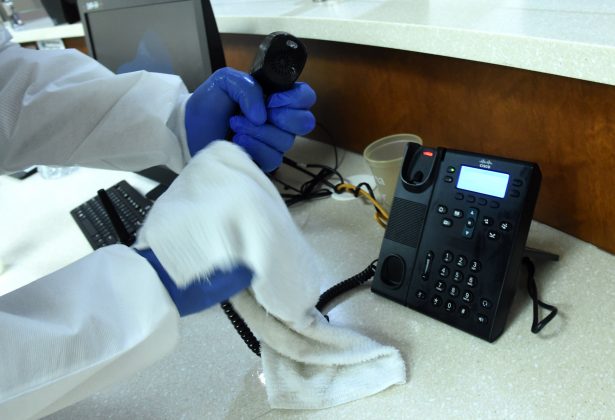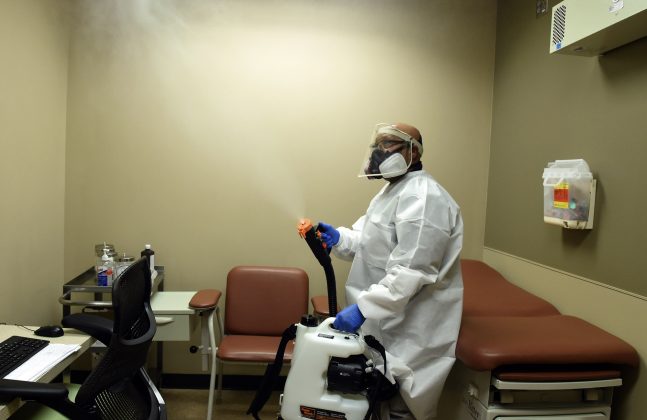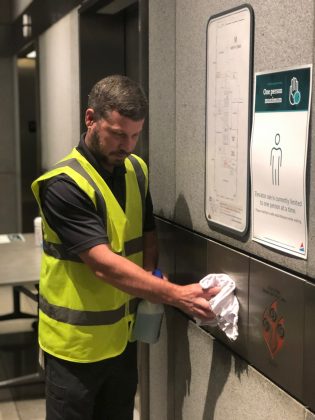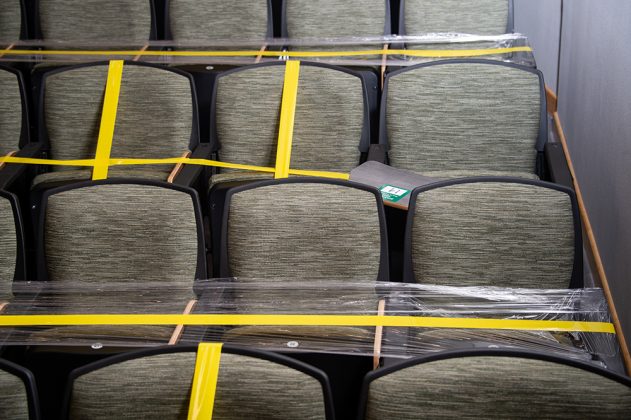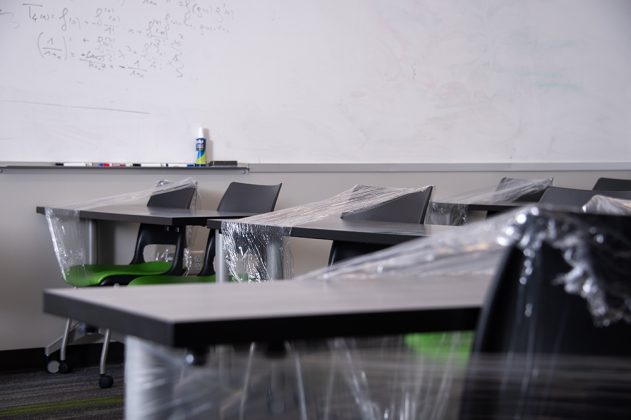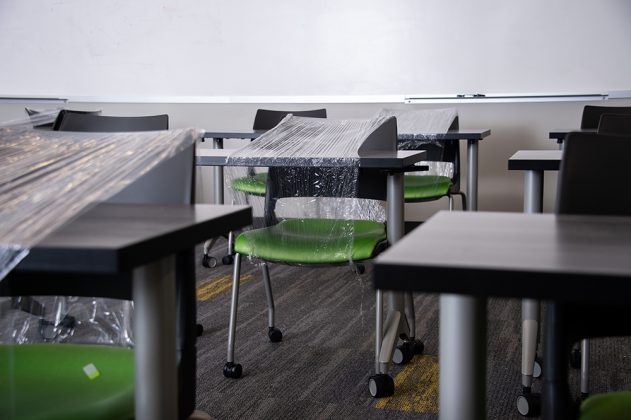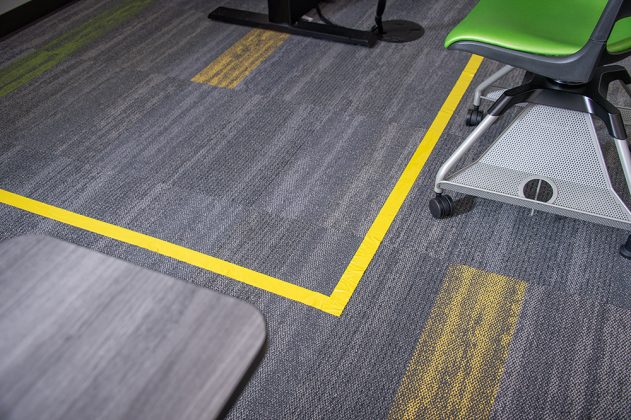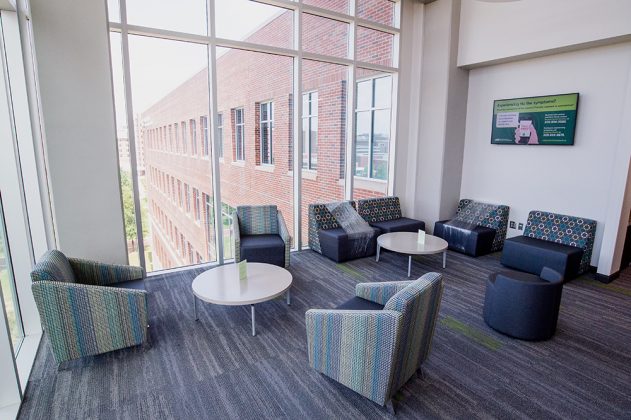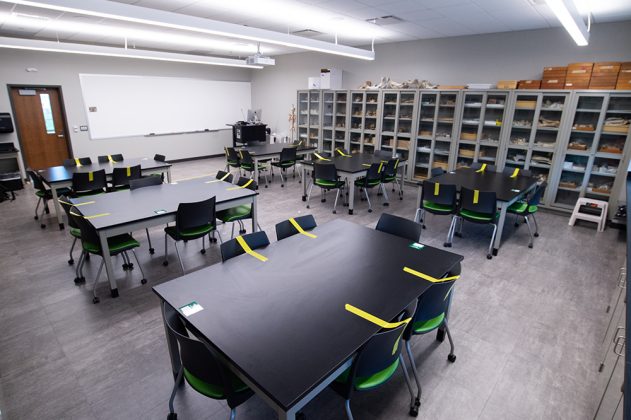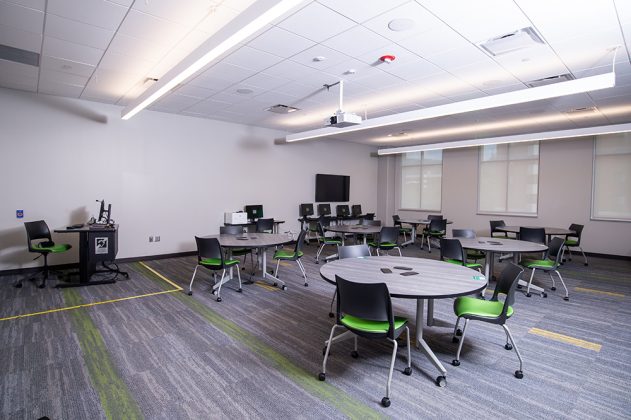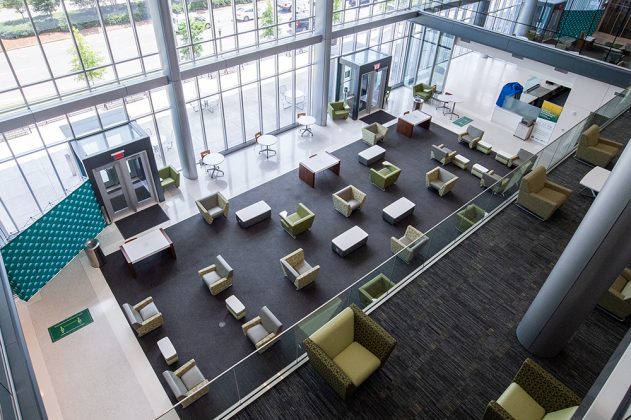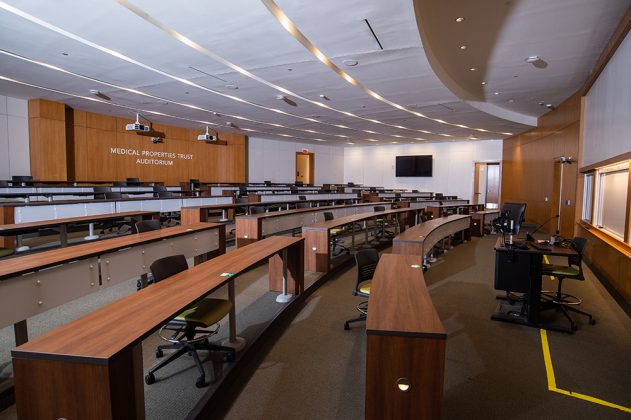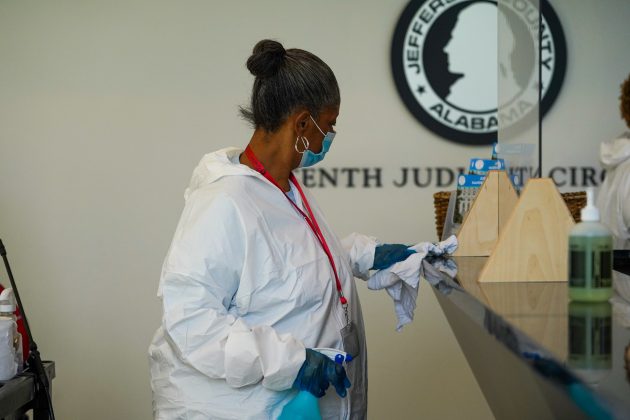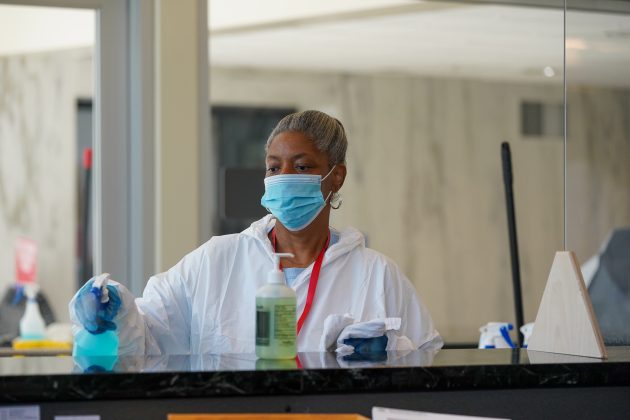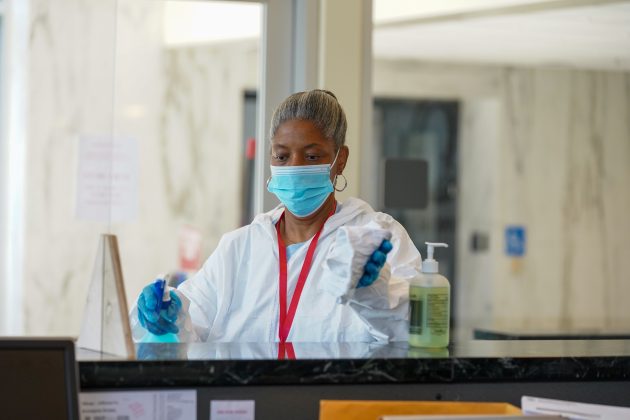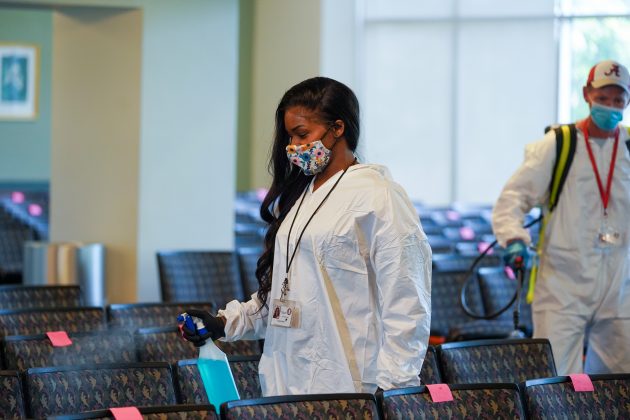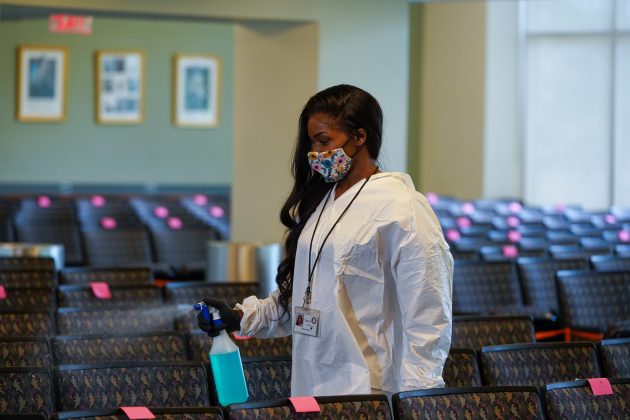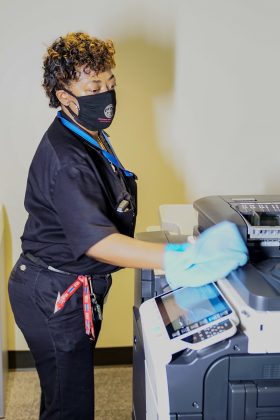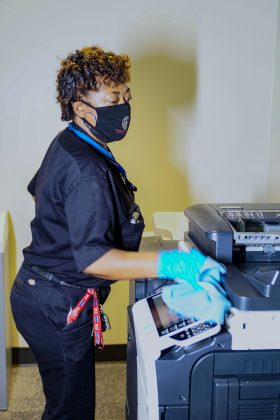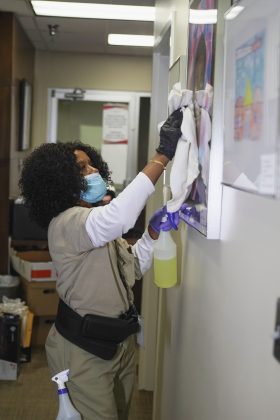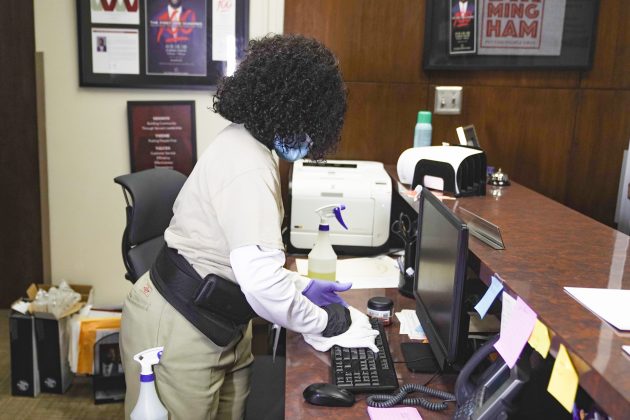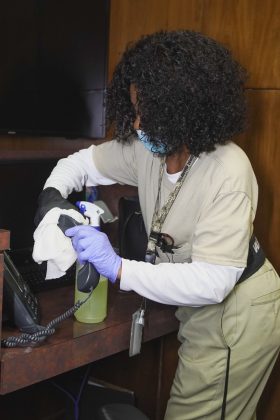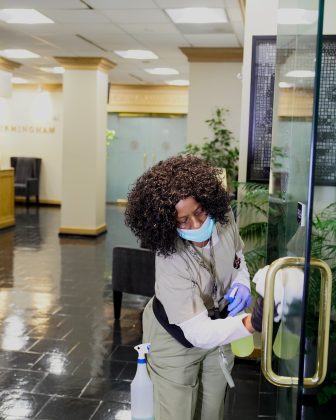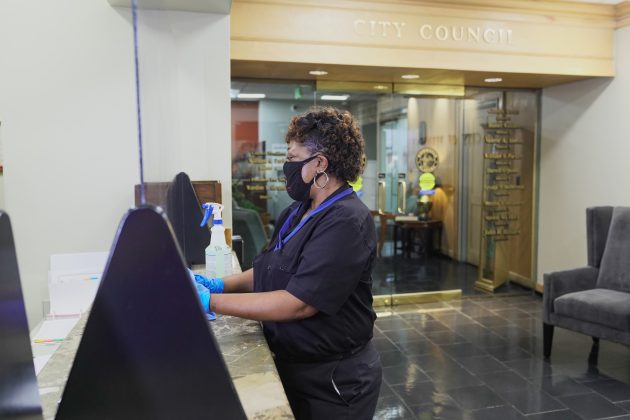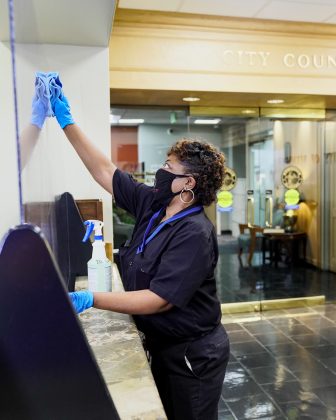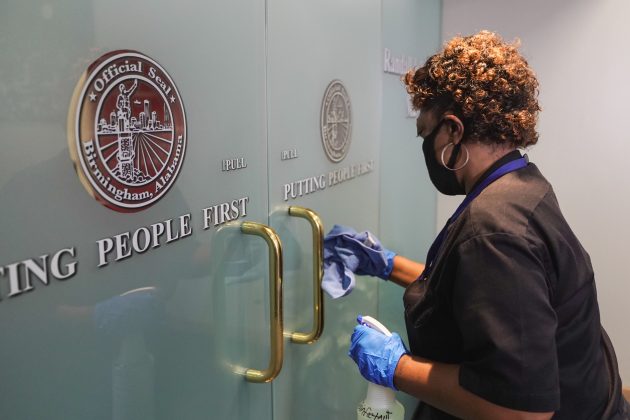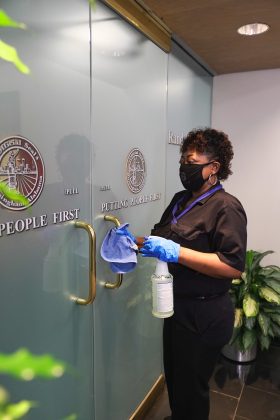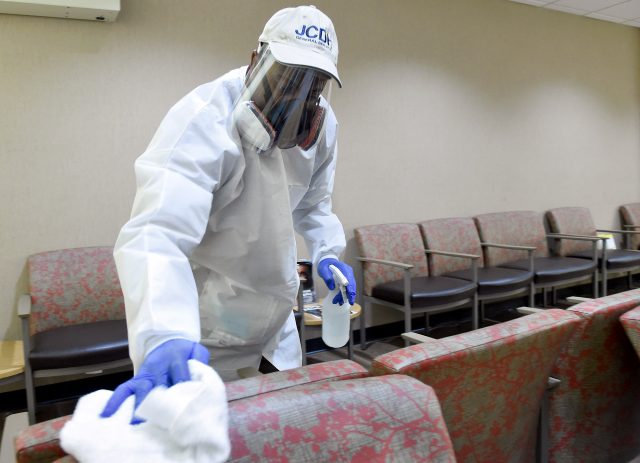
By Sydney Melson
The Birmingham Times
Much like the doctors, nurses, and other first responders on the front lines of the COVID-19 pandemic, building services professionals throughout Jefferson County work around the clock to make health and safety a priority.
Despite the long hours, some janitorial service employees take on extra duties to clean and sanitize the buildings where hundreds work and thousands visit every month. These often-overlooked front-line workers are the ones who wipe doorknobs, elevator buttons, and railings to protect students attending schools, patients visiting doctors, and residents paying for car tags.
Doug O’Shields, manager of the University of Alabama at Birmingham (UAB) Building Services Department, probably speaks for many when he says, “I have asked so much of [my employees], and they have responded wonderfully. I’m very proud of that.”
Here’s a look at how building services professionals clean and disinfect some of Birmingham’s larger facilities in these unprecedented times.
University of Alabama at Birmingham (UAB)
According to O’Shields, UAB follows a number of new protocols and different approaches to cleaning the school’s roughly 100 academic and research buildings. Preparation depends largely on personal protective equipment (PPE) and the number of people who disinfect the area.
“[Building Services workers] are always in gloves and masks, but sometimes we wear gowns, sometimes we wear face shields. I try to keep [teams small], limiting them to about five people,” he said.
UAB’s Building Services Department employs 200 people. Workers are assigned one to two floors in each building across campus to repeatedly clean restrooms, classrooms, labs, food courts, and reception areas throughout the day where employees are in “constant motion,” said O’Shields, who has served in his role at the university for 40 years.
When UAB closed in March due to COVID-19, every building was thoroughly cleaned, O’Shields said. When the campus reopened in August, the focus was on sanitizing everything—door handles, elevator buttons, inside restrooms, tabletops, glass, “just wherever people constantly put their hands,” he said.
Posted around campus are signs and notices that remind people to follow social distancing protocols: “Stickers mark off six feet and remind [people] to wear masks. … There are numbers on desks [in classrooms] to indicate where someone can sit,” O’Shields said.
In food courts, furniture has been rearranged or removed to discourage people from gathering in crowded spaces, and food services are currently take-out only. Office areas are considered a more personal space, so UAB employees who want a deep clean can call in work orders to do so, but that can vary.
“Some people want you to clean, some people don’t want you in their office,” he said.
When cleaning entire rooms or buildings, UAB’s Building Services employees use electrostatic disinfecting machines, which spray cleaning chemicals using a negative charge that allows disinfectant to cling to and wrap around surfaces: “We have up to 30 of those machines in use at UAB,” O’Shields said.
The department uses hospital-grade disinfecting chemicals, many of which are very potent “quaternary ammonium” compounds. Virex 256 and Vital Oxide are two of their most commonly used chemicals.
Electrostatic machines are here to stay, O’Shields said. “That’ll likely be a part of our cleaning forever.”
Overall, his greatest concern is ensuring that his staff is safe, and he stressed that Building Services workers have gone above and beyond to ensure the safety of faculty, staff, and students at UAB.
“I have asked so much of them, and they have responded wonderfully. I’m very proud of that,” O’Shields said of his team.
Birmingham City Schools (BCS)
BCS opened on September 8 with nine weeks of remote learning, but administrators are not taking any chances. Each person who enters any BCS building must have their temperature checked and respond to a standard Centers for Disease Control and Prevention (CDC) health screening checklist, which asks whether they have been exposed to someone with COVID-19 or if they’ve recently had a fever, among other questions.
“You can’t get any farther than the front door. You have to be buzzed in, so you’re automatically checked,” said Victor Pettus, BCS director of facilities, operations, and maintenance.
The first step for the school system after the COVID-19 closures in March was to clean every building.
“We had an outside vendor come in to deep clean and sanitize every school and facility,” Pettus said. “Since then, we’ve outfitted each building with an electrostatic cleaning device.”
Custodians for each school building are supervised by the school principals, so the cleaning schedules are not overseen by his department, but Pettus has recommendations on how each building should be maintained.
“Every time a class leaves for lunch, [for instance, workers should] go in and wipe common-touch areas, light switches, doorknobs,” he said, adding that the entire school building should be sanitized at the end of the day with the electrostatic machines.
Pettus, who has been with BCS for 25 years, said he does have some concerns when students return, and he is asking that children wear masks and socially distance. While the janitorial staff will do their best to regularly wipe down high-touch areas, they can’t control kids being kids, he said.
City of Birmingham
At Birmingham City Hall, crews are doing more frequent cleanings of high-touch areas, such as telephones, light switches, tables, doorknobs, snack machines in the break rooms, and bathroom fixtures, said Ralph Debardlabon, director of Public Works for the city. Those high-touch areas are wiped down every hour by a team of 14 workers.
“We started off [at the beginning of COVID-19] every hour, but long-term we’re going to do 30-minute cleaning on a regular basis,” he said.
If the workload increases, the Public Works Department will employ additional workers, but the brunt of the work is handled by the main workers who clean the surfaces at several buildings, including Birmingham City Hall; police headquarters and precincts; the city jail; and the south municipal court. Debardlabon, who has been with the city for 32 years, said each building is given a deep cleaning once a week, except police precincts, which are done every other week.
“As long as we’ve got what we need, such as PPE, we should be OK,” he said.
In spaces where there have been confirmed COVID-19 cases, Debardlabon said Public Works employees gear up from head to toe in coverall suits, safety goggles, latex gloves, and rubber boots to do deep cleanings; they wear standard protective gear, such as face masks, for day-to-day activities.
“On weekends, we mist everything down with backpack sprayers … [using] this chemical called H2Orange. We also have Lysol sprays and wipes for regular cleanings,” he said, noting that the city purchases chemicals directly from a company based out of Bessemer and the Public Works Department handles deep-cleaning efforts themselves.
At City Hall, for instance, workers are typically stationed on each floor to make sure those areas are being cleaned.
“If someone’s office space needs to be wiped down, we can do it [while they are there] or go in and wipe it down when the person isn’t there,” he said. “Otherwise, they may ask us for wipes or ask us to come back later.”
Signs in City Hall advise people to wear masks and socially distance, and elevators in the building currently only allow four people at a time. The protocols appear to be working, and the cleaning crew is staying safe.
“Knock on wood, we haven’t had any [of our] employees test positive [for COVID-19],” Debardlabon said. “My biggest concern is making sure all of the staff and employees are taking every precaution, so they won’t be affected.”
Jefferson County
Jefferson County has a sprawling network of buildings, including courthouses in downtown Birmingham and Bessemer; satellite courthouses in Hoover and Gardendale; the Birmingham and Bessemer criminal justice centers; and the Birmingham Justice Center. Each building has required social distancing stickers on the floors to indicate six feet, as well as plexiglass on reception counters. Sanitation stations are set up on every floor, so the public has easy access to hand sanitizer. In addition, face masks and shields, gloves, and hand sanitizer are routinely stocked up for county employees.
Chris Hill is facilities manager for the county’s General Services Department, which includes about 75 total employees in the Cleaning Department. To help with janitorial work, General Services contracts additional workers through other companies, including Falls Janitorial and Hill’s Janitorial (no relation).
For daily cleaning, one to two staff members are assigned to each floor of every building. The Cleaning Department crew is also responsible for nightly cleanings of the courtrooms, as well as routine cleanings of high-touch areas, such as countertops, bathrooms, and doorknobs every two to three hours.
When dealing with special requests, county Cleaning Department crew members will don Tyvek suits, head-to-toe, chemical-resistant coveralls, that are paired with goggles and face shields. If a courtroom needs to be disinfected, for example, General Services contracts the cleaning out to Cintas, another company that provides janitorial services.
As for commission meetings held in the chambers, chairs are set up outside the room so people can still be in attendance without sitting too close.
Hill, who joined the General Services Department as the facilities manager about three years ago but has worked with Jefferson County for 25, said the public has been supportive with all of the COVID-19 health and safety changes.
“When you first enter a building, security will stop you and make sure you’re wearing some type of mask,” he said.
Jefferson County Department of Health (JCDH)
Cleaning and operations have changed to adapt to the pandemic, which means some health services can be done in the parking lot, said Dolores Johnson, JCDH health services administrator. For example, staffers prescreen visitors before they are allowed into the building.
“Based on where [visitors] park, we have staff who service them from the parking lot,” she said.
If someone has an appointment, the person is screened. Basic services, such as obtaining a birth certificate, can be handled in the parking lot.
Johnson oversees daytime cleaning of the Guy Tate Building, the main JCDH facility, the Eastern Health Center in Birmingham, the Western Health Center in Midfield, and other JCDH annex buildings—all of which have plexiglass barriers installed on reception counters.
“We’ve always had cleaning crews come in at night; that work was contracted out. [Now], the skilled laborers that work in [Jefferson County] General Services have taken on some additional duties to help with cleaning during the day,” said Johnson, who has worked for the JCDH for 26 years.
In the main facility, three workers wipe down hard fixtures and surfaces, as well as elevators and doorknobs. The cleaning crew also handles exam rooms, isolation rooms, and lobbies. In addition, EcoLab, a water, hygiene, and infection prevention solutions and services company, helps with disinfecting efforts.
“We also have backpack foggers that spray disinfectant, and the night crew disinfects and cleans, too,” she said.
An additional three workers are sent to other buildings to handle cleaning, even though the Eastern and Western buildings have not been offering a lot of services.
Johnson said the JCDH will continue with these practices until COVID-19 no longer poses a significant health risk. Her biggest concern remains the availability of PPE for health department employees, as the equipment is in high demand for health facilities.
Alabama Power
Even though Alabama Power’s offices are not open to the public, more than 200 of its buildings across the state are still in operation, so maintenance is still a necessity—and employees are working around the clock to maintain service for customers, said Donovan Cox, who has served as the Alabama Power Facilities Services Department manager for 22 years.
“In my department, there are 154 employees, … and more [custodial] employees are assigned to corporate headquarters [in Birmingham], compared with our business offices,” he said.
Cleaning schedules for business offices vary, but the corporate office tends to be more densely populated, so cleaning schedules are more rigorous.
“Before [COVID-19], our janitorial group would come in the afternoon and clean because there were fewer employees in the building. Now, we’re cleaning and disinfecting throughout the day,” Cox said, noting that the chemicals used by Alabama Power are in accordance with the U.S. Environmental Protection Agency’s (EPA) approved chemicals list.
High-traffic areas, such as elevator call buttons, are prioritized; those areas are typically wiped down every 30 minutes to one hour.
“In a conference room, which may be used once a day, we may just clean it every two to three hours. It just depends on how much [a room or facility] is used,” he said.
As business offices open to the public, however, cleaning schedules will be increased.
Social distancing protocols are pretty standard, too. Plexiglass barriers are installed on desks throughout buildings to encourage social distancing. Also, crews who have to be out in public for power restoration jobs are employing social distancing protocols and using PPE.
“A lot of what we’ve been doing is educating our employees about and encouraging them to use proper hygiene, including washing hands and using hand sanitizer. We’ve also installed a lot of signage throughout our facilities to encourage them to do the right things,” Cox said, adding that the company urges employees to do self-checks to stay on top of their well-being.
As the pandemic continues, “We’re still learning a lot about the virus. My biggest concern is making sure we’re doing everything we can,” Cox said.

